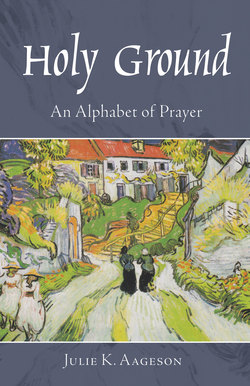Читать книгу Holy Ground - Julie K. Aageson - Страница 11
На сайте Литреса книга снята с продажи.
Compassion
ОглавлениеCompassion as prayer? Compassion as a way of looking at the world, a habit, a lens for understanding God and the truth of God that is in each of us? Compassion as holy ground? Truth to tell, sitting as so many of us do in the midst of comfort and privileged lives in the first world, I’m uneasy writing about compassion. It falls a bit too easily off our lips. Its sound and its intent require too much of us. If we truly allow ourselves the spirit of compassion—the cost of compassion—our worlds surely will be turned upside down. Our hearts will be broken. Compassion is more than concern, more than empathy, much more than understanding and kindness.
Like you, I’m overwhelmed nearly every day by a steady barrage of need—suffering, injustice, despair, brokenness—all calling for more compassion than the world seems able to provide or any one of us can muster. How do we not become callous and numb or blindly indifferent? How do we engage meaningfully with the daily news, the hurts of our neighbors, and the stream of needs that confront us at every turn? How do we find hearts of compassion? How do we avoid hearts that may, like Dr. Seuss describes, be two sizes too small?
Compassion makes us human. In the face of what sometimes seems an uncaring world, we are part of a church that proclaims Christ’s body present in each of us. We are part of a tradition that admonishes us to love our neighbor as our self. The compassionate body of Christ is unafraid to confront difficult issues of race and gender, wealth and poverty, justice and peace. The compassionate body of Christ provides shelter for the homeless, food for the hungry, money for the destitute, advocacy for the voiceless—recognizing that we, all of us, are broken, hungry, poor in spirit, and in need of compassion.
Seeing the body of a little boy washed ashore from the capsized boat his family used to escape the ravages of war in Syria or the face of a young mother giving birth in a makeshift hospital in a refugee camp in Eastern Europe is so wrenchingly painful that we catch ourselves looking away. What will compassion mean if we truly engage these images which are not just pictures on our television screens but real, living stories of unimaginable suffering?
What does it mean to have compassion? What does it mean to be the body of Christ in the world? Can we truly enter into the broken places, the shattered lives, the convoluted and complex political realities that make up our twenty-first-century world? How do we see the world through the broken, loving heart of Christ? Television commentators often warn us of images that may be disturbing—“you may want to look away,” they say. How, really, do we love our neighbors as ourselves? Compassion surely will break our hearts.
Teresa of Avila, a practical, no-nonsense sixteenth-century saint and mystic, knew something about compassion:
Christ has no body on earth but yours.
No hands but yours, no feet but yours.
Yours are the eyes through which to look out
Christ’s compassion to the world.
Yours are the feet with which he is to go about doing good.
Yours are the hands with which he is to bless people now.1
Compassion requires acts and deeds and yes, compassion makes us human. Acts of compassion mean caring for one another and those we’ll never meet. Compassion is about political involvement, willingness to embrace difficult issues, courage to expose injustice and inequality, readiness and willingness to act. These are acts of prayer, of entering into another’s heart and hurt, another’s suffering. These are acts of bravery, audacity, boldness, selflessness. Compassion exacts and demands commitment.
Compassion is feeding the hungry, clothing the naked, giving drink to the thirsty, visiting the imprisoned, caring for the sick, burying the dead, counseling the doubtful, instructing the ignorant, correcting sinners, comforting the sorrowful, forgiving all injuries, bearing wrongs with patience, praying for the living and the dead. These are the hard works of mercy, of compassion.
May we live uneasily with our comfortable and privileged lives. May we never grow heartless or insensitive. May our hearts be open to loosing the bonds of injustice, to undoing the thongs of the yoke, to letting the oppressed go free, to breaking every yoke (Isaiah 58:6). May our hearts be broken.
O God, help us to share your bread with the hungry, to bring the homeless poor into your house and ours, to acknowledge the naked and cover them, and not to hide ourselves from your own kin. Take away our hearts of stone. Make us your body, your hands, your feet. Make us your eyes for showing Christ’s compassion to the world.
REFLECTION
If we truly allow ourselves the spirit of compassion—the cost of compassion—our worlds surely will be turned upside down. Our hearts will be broken. Compassion is more than concern, more than empathy, much more than understanding and kindness.
In what ways does compassion entail more than concern or empathy, more than understanding and kindness?
What does it mean to you that compassion is an act of prayer?
How do we avoid having hearts of stone to become Christ’s body, hands, feet?
How do we become Christ’s eyes for showing compassion to the world?
What is the cost of compassion?
Devotion
1. Saint Teresa of Avila in her iconic poem, “Christ Has No Body.”
